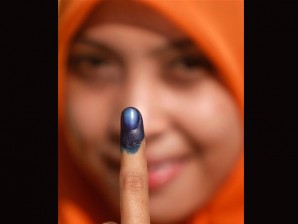Voting begins in tight Malaysian national election

Incumbent Prime Minister Najib Razak has voiced confidence that the National Front coalition will remain Malaysia’s dominant political force despite facing its most unified opposition challenge since independence from Britain in 1957.
Opposition leader Anwar Ibrahim’s three-party alliance hopes widespread grievances over how the National Front has struggled with accusations of arrogance, abuse of public funds and racial discrimination will translate into a surge of votes to propel the opposition into power.
Nearly 8 million people cast ballots in the first four hours of voting, comprising almost 60 percent of the 13.3 million registered voters, the Election Commission said. Some lined up for more than an hour at schools and other voting centers, showing off fingers marked with ink to prevent multiple voting after they had finished. Polls were scheduled to close after nine hours of voting, and results were expected late Sunday.
The National Front held 135 seats in the 222-member Parliament that was dissolved last month. It is anxious to secure a stronger five-year mandate and regain a longtime two-thirds legislative majority that it lost in 2008.
“The government has made some mistakes but the prime minister has made changes and I believe they (the National Front) will do their best to take care of the people’s welfare,” said Mohamed Rafiq Idris, a car business owner who waited in a long line at a central Selangor state voting center with his wife and son.
Article continues after this advertisementOthers disagreed, saying they hope enough Malaysians will back an untested opposition that pledges to form a cleaner, fairer government.
Article continues after this advertisement“I grew up recognizing that my parents voted for the present coalition at almost every general election. This time, they voted for the opposition. People do change,” said banker Bernie Lim, who was voting for the first time.
Najib says only the National Front can maintain stability in Malaysia, which has long been one of Southeast Asia’s most peaceful and relatively wealthier countries.
“Your support is paramount if we are to keep to our path of development, if we are to continue our journey toward complete transformation,” Najib said in a statement to voters. “This election is about fulfilling promises, bringing hope and upholding trustworthiness.”
Many political observers believe the race will be tight, with the National Front potentially edging out Anwar’s alliance partly because of its entrenched support in predominantly rural districts.
The opposition is likely to retain control of at least two of Malaysia’s 13 state legislatures and should perform well in urban constituencies where middle-class voters have clamored for change.
If the opposition wins, it would mark a remarkable comeback for Anwar, a former deputy prime minister who was fired in 1998 and subsequently jailed on corruption and sodomy charges that he says were fabricated by his political enemies. He was released from jail in 2004 and now leads the biggest threat to the National Front.
“We stand today on the brink of history,” Anwar said in a statement. “Sunday’s election will mark the decisive step in an amazing, peaceful, democratic revolution that will take Malaysia into a new era.”
The opposition is worried about electoral fraud, saying the National Front hopes to use foreign migrants from Bangladesh, the Philippines and Indonesia to vote unlawfully. Government and electoral authorities have rejected the allegations.
The National Front’s aura of invincibility has been under threat since three of Malaysia’s main opposition parties combined forces five years ago. Its 2008 winning margin was down sharply from the 2004 vote when the National Front won 90 percent of Parliament’s seats, and in recent years it has since been increasingly accused of complacency and heavy-handed rule.
Najib, who took office in 2009, embarked on a major campaign to restore his coalition’s luster. In recent months, authorities have provided cash handouts to low-income families and used government-linked newspapers and TV stations to criticize the opposition’s capability to rule.